| Listing 1 - 10 of 311 | << page >> |
Sort by
|
Book
ISBN: 9782294707599 2294707591 Year: 2010 Publisher: Issy-les-Moulineaux : Elsevier Masson,
Abstract | Keywords | Export | Availability | Bookmark
 Loading...
Loading...Choose an application
- Reference Manager
- EndNote
- RefWorks (Direct export to RefWorks)
Language Disorders --- Dyslexia --- Child --- Language Development Disorders
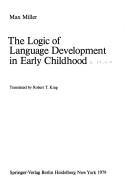
ISBN: 354009606X 038709606X 3642674100 3642674089 9783540096061 Year: 1979 Volume: 3 Publisher: Berlin New York : Springer-Verlag,
Abstract | Keywords | Export | Availability | Bookmark
 Loading...
Loading...Choose an application
- Reference Manager
- EndNote
- RefWorks (Direct export to RefWorks)
Language development. --- Psycholinguistics --- Developmental psychology --- Language Development. --- #KVHB:Taalontwikkeling --- Development, Language --- Developments, Language --- Language Developments --- Language Acquisition --- Acquisition, Language --- Language Development
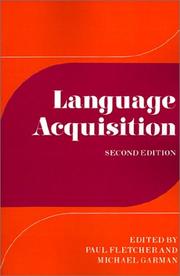
ISBN: 0521259746 0521277809 0511620683 9780521277808 9780511620683 Year: 1986 Publisher: Cambridge : Cambridge University Press,
Abstract | Keywords | Export | Availability | Bookmark
 Loading...
Loading...Choose an application
- Reference Manager
- EndNote
- RefWorks (Direct export to RefWorks)
The aim of the first edition of Language Acquisition was to provide as comprehensive a description and explanation as possible of the changes in the child's language as he or she grows older. In this second edition Paul Fletcher and Michael Garman have the same fundamental aim. Six years later the field has not changed dramatically, but there have been fruitful theoretical developments - the learnability hypothesis, in particular, has been influentially expounded - and empirical work seeking evidence of specific language capacities in children has made notable advances. Equally significant are shifts in emphasis: the growing interest in cross-linguistic studies, for example, or accounts of language development of reading and writing. All these changes are reflected in the second edition. About half the chapters are entirely new, having been specially commissioned for this edition. The remainder of the book consists of substantially revised versions of chapters from the first edition. Like its predecessor, this collection is the work of distinguished specialists from many countries and will provide an invaluable resource for students and professionals alike who have an interest in the field of child language acquisition.
in infancy and childhood --- Language Development. --- Development, Language --- Developments, Language --- Language Developments --- LANGUAGE DEVELOPMENT, in infancy and childhood --- LANGUAGE DEVELOPMENT, in infancy and childhood. --- Language development, in infancy and childhood. --- Language acquisition --- Language Development --- Psycholinguistics --- Acquisition of language --- Developmental linguistics --- Developmental psycholinguistics --- Language and languages --- Language development in children --- Psycholinguistics, Developmental --- Interpersonal communication in children --- Acquisition --- Language acquisition. --- Langage --- Language Acquisition --- Acquisition, Language --- Arts and Humanities --- Language & Linguistics --- Language Development - in infancy and childhood
Book
Year: 2017 Publisher: Frontiers Media SA
Abstract | Keywords | Export | Availability | Bookmark
 Loading...
Loading...Choose an application
- Reference Manager
- EndNote
- RefWorks (Direct export to RefWorks)
The digital age is changing our children’s lives and childhood dramatically. New technologies transform the way people interact with each other, the way stories are shared and distributed, and the way reality is presented and perceived. Parents experience that toddlers can handle tablets and apps with a level of sophistication the children’s grandparents can only envy. The question of how the ecology of the child affects the acquisition of competencies and skills has been approached from different angles in different disciplines. In linguistics, psychology and neuroscience, the central question addressed concerns the specific role of exposure to language. Two influential types of theory have been proposed. On one view the capacity to learn language is hard-wired in the human brain: linguistic input is merely a trigger for language to develop. On an alternative view, language acquisition depends on the linguistic environment of the child, and specifically on language input provided through child-adult communication and interaction. The latter view further specifies that factors in situated interaction are crucial for language learning to take place. In the fields of information technology, artificial intelligence and robotics a current theme is to create robots that develop, as children do, and to establish how embodiment and interaction support language learning in these machines. In the field of human-machine interaction, research is investigating whether using a physical robot, rather than a virtual agent or a computer-based video, has a positive effect on language development. The Research Topic will address the following issues: - What are the methodological challenges faced by research on language acquisition in the digital age? - How should traditional theories and models of language acquisition be revised to account for the multimodal and multichannel nature of language learning in the digital age? - How should existing and future technologies be developed and transformed so as to be most beneficial for child language learning and cognition? - Can new technologies be tailored to support child growth, and most importantly, can they be designed in order to enhance specifically vulnerable children’s language learning environment and opportunities? - What kind of learning mechanisms are involved? - How can artificial intelligence and robotics technologies, as robot tutors, support language development? These questions and issues can only be addressed by means of an interdisciplinary approach that aims at developing new methods of data collection and analysis in cross-sectional and longitudinal perspectives. We welcome contributions addressing these questions from an interdisciplinary perspective both theoretically and empirically.
digital environments --- language development --- robotics --- learning mechanisms --- situated and embodied cognition --- digital environments --- language development --- robotics --- learning mechanisms --- situated and embodied cognition
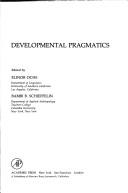
ISBN: 0125245505 9780125245500 Year: 1979 Publisher: New York London : Academic Press,
Abstract | Keywords | Export | Availability | Bookmark
 Loading...
Loading...Choose an application
- Reference Manager
- EndNote
- RefWorks (Direct export to RefWorks)
Psycholinguistics --- Pragmatics --- Language development --- Children --- Pragmatique --- Enfants --- Language --- Langage --- -Pragmatics --- #SBIB:309H511 --- Pragmalinguistics --- General semantics --- Language and languages --- Logic, Symbolic and mathematical --- Semantics (Philosophy) --- Childhood --- Kids (Children) --- Pedology (Child study) --- Youngsters --- Age groups --- Families --- Life cycle, Human --- Verbale communicatie: algemene pragmatiek, stilistiek en teksttheorie, discoursanalyse --- Philosophy --- Pragmatics. --- Language development. --- Psycholinguistics. --- Language. --- Language Development. --- Language development in children --- Vocabulary --- Interpersonal communication in children --- Children - Language
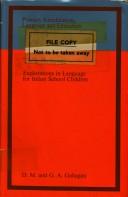
ISBN: 0710068751 Year: 1970 Publisher: London : Routledge and Kegan Paul,
Abstract | Keywords | Export | Availability | Bookmark
 Loading...
Loading...Choose an application
- Reference Manager
- EndNote
- RefWorks (Direct export to RefWorks)
Language Development. --- Remedial Teaching. --- English language --- -English language --- -Popular culture --- Culture, Popular --- Mass culture --- Pop culture --- Popular arts --- Communication --- Intellectual life --- Mass society --- Recreation --- Germanic languages --- Remedial Teachings --- Teaching, Remedial --- Teachings, Remedial --- Development, Language --- Developments, Language --- Language Developments --- Psycholinguistics --- Dialects --- -Remedial teaching --- Popular culture --- Language development. --- Remedial teaching --- Remedial teaching. --- -Language Development. --- Language Development --- Remedial Teaching --- Culture --- Language Acquisition --- Acquisition, Language
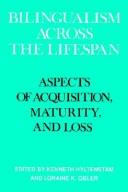
ISBN: 0521359988 0521352258 0511611781 9780521359986 9780511611780 Year: 1989 Publisher: Cambridge : Cambridge University Press,
Abstract | Keywords | Export | Availability | Bookmark
 Loading...
Loading...Choose an application
- Reference Manager
- EndNote
- RefWorks (Direct export to RefWorks)
Bilingualism Across the Lifespan examines the dynamics of bilingual language processing over time from the perspectives of neurolinguistics, psycholinguistics and sociolinguistics. This multidisciplinary approach is fundamental to an understanding of how the bilingual's two (or more) language systems interact with each other and with other higher cognitive systems, neurological substrates, and social systems - a central theme of this volume. Contributors examine the nature of bilingualism during various phases of the lifecycle - childhood, adulthood, and old age - and in various health/pathology conditions. Topics range from code separation in the young bilingual child, across various types of language pathologies in adult bilinguals, to language choice problems in dementia. The volume thus offers a broad overview of current theoretical and empirical approaches to the study of bilingualism. It will interest and stimulate researchers and graduate students in the fields of linguistics, neuropsychology, and developmental psychology, as well as in foreign language teaching, speech pathology, educational psychology, and special education.
Bilingualism --- Language acquisition --- LANGUAGE DEVELOPMENT --- Language Development. --- Acquisition of language --- Developmental linguistics --- Developmental psycholinguistics --- Language and languages --- Language development in children --- Psycholinguistics, Developmental --- Development, Language --- Developments, Language --- Language Developments --- Acquisition --- Bilingualism. --- Language Development --- Interpersonal communication in children --- Psycholinguistics --- Languages in contact --- Multilingualism --- Bilinguisme --- Langage --- Language Acquisition --- Acquisition, Language --- Arts and Humanities --- Language & Linguistics --- Language acquisition.
Book
ISBN: 9780198786825 0198786824 9780191835407 Year: 2018 Publisher: Oxford ; New York : Oxford University Press,
Abstract | Keywords | Export | Availability | Bookmark
 Loading...
Loading...Choose an application
- Reference Manager
- EndNote
- RefWorks (Direct export to RefWorks)
This handbook reviews the current state of the art in the field of psycholinguistics. Part I deals with language comprehension at the sublexical, lexical, and sentence and discourse levels. It explores concepts of speech representation and the search for universal speech segmentation mechanisms against a background of linguistic diversity and compares first language with second language segmentation. It also discusses visual word recognition, lexico-semantics, the different forms of lexical ambiguity, sentence comprehension, text comprehension, and language in deaf populations. Part II focuses on language production, with chapters covering topics such as word production and related processes based on evidence from aphasia, the major debates surrounding grammatical encoding. Part III considers various aspects of interaction and communication, including the role of gesture in language processing, approaches to the study of perspective-taking, and the interrelationships between language comprehension, emotion, and sociality. Part IV is concerned with language development and evolution, focusing on topics ranging from the development of prosodic phonology, the neurobiology of artificial grammar learning, and developmental dyslexia. The book concludes with Part V, which looks at methodological advances in psycholinguistic research, such as the use of intracranial electrophysiology in the area of language processing.
E-books --- Psycholinguistics --- Psychologie --- Psycholinguistique --- Langage --- Ambiguïté --- Compréhension --- Lexique --- Language Development. --- Psycholinguistics. --- Psychologie. --- Psycholinguistique. --- Compréhension. --- Lexique.
Book
ISBN: 311040995X 3110409879 Year: 2017 Publisher: Washington, District of Columbia : De Gruyter Mouton : American Psychological Association,
Abstract | Keywords | Export | Availability | Bookmark
 Loading...
Loading...Choose an application
- Reference Manager
- EndNote
- RefWorks (Direct export to RefWorks)
In recent decades, a growing number of children have been diagnosed with autism spectrum disorder (ASD), a condition characterized by, among other features, social interaction deficits and language impairment. Yet the precise nature of the disorder's impact on language development is not well understood, in part because of the language variability among children across the autism spectrum. The contributors to this volume - experts in fields ranging from communication disorders to developmental and clinical psychology to linguistics - use innovative techniques to address two broad questions: Is the variability of language development and use in children with ASD a function of the language, such that some linguistic domains are more vulnerable to ASD than others? Or is the variability a function of the individual, such that some characteristics predispose those with ASD to have varying levels of difficulty with language development and use? Contributors investigate these questions across linguistic levels, from lexical semantics and single-clause syntax, to computationally complex phonology and the syntax-pragmatics interface. Authors address both spoken and written domains within the wider context of language acquisition. This timely and broadly accessible volume will be of interest to a broad range of specialists, including linguists, psychologists, sociologists, behavioral neurologists, and cognitive neuroscientists.
Autistic people --- Autism --- Developmentally disabled --- Language. --- Patients --- Autism. --- Cognitive Linguistics. --- Communication Disorders. --- Language Development. --- Psycholinguistics.
Book

ISBN: 3110784750 3110784637 Year: 2022 Publisher: Berlin/Boston De Gruyter
Abstract | Keywords | Export | Availability | Bookmark
 Loading...
Loading...Choose an application
- Reference Manager
- EndNote
- RefWorks (Direct export to RefWorks)
Der sprachen- und bildungsstufenübergreifend angelegte Band stellt Heterogenität als Merkmal pädagogischer Settings in den Fokus und geht der zentralen Frage nach, wie der mehrsprachigen Lebenswirklichkeit in einem an der Bildungssprache Deutsch orientierten System entsprochen werden kann. Die Beiträge spiegeln die vielfältigen Ausgangslagen, Bedarfe und Perspektiven wider, die den deutschsprachigen Raum prägen. Dabei werden Ausbaupotenziale von Sprachförderung ebenso untersucht wie Faktoren und Facetten einer entwicklungsadäquaten Förderung von Deutsch als Bildungssprache, Gelingensbedingungen für Sprachaneignung im Kontext herkunftsbedingter Mehrsprachigkeit und integrative Ansätze zum gesteuerten (Mehr-)Sprachenerwerb. Durch die Bündelung dieser inhaltlich und methodisch breiten Themenfelder zu den vier Schwerpunkten Bildungssprache Deutsch, herkunftsbedingte Mehrsprachigkeit, Fremdsprachenerwerb und Sprachförderkompetenzen können Befunde und Handlungsempfehlungen für Bereiche zusammengeführt werden, die für angewandte Linguist/-innen, Sprachlehrforscher/-innen, Sprachendidaktiker/-innen, Lehrkräftebildner/-innen und Pädagog/-innen ebenso relevant sind wie für Entscheidungsträger/-innen in mit Sprache befassten Institutionen. This volume spans various languages and education levels, focusing on heterogeneity as an immanent characteristic of pedagogical settings. Its examines the potential of language development, the factors and facets of the developmentally appropriate promotion of German as a language of education, the conditions for successful language acquisition in the context of multilingualism, and integrative approaches toward controlled language acquisition.
| Listing 1 - 10 of 311 | << page >> |
Sort by
|

 Search
Search Feedback
Feedback About UniCat
About UniCat  Help
Help News
News